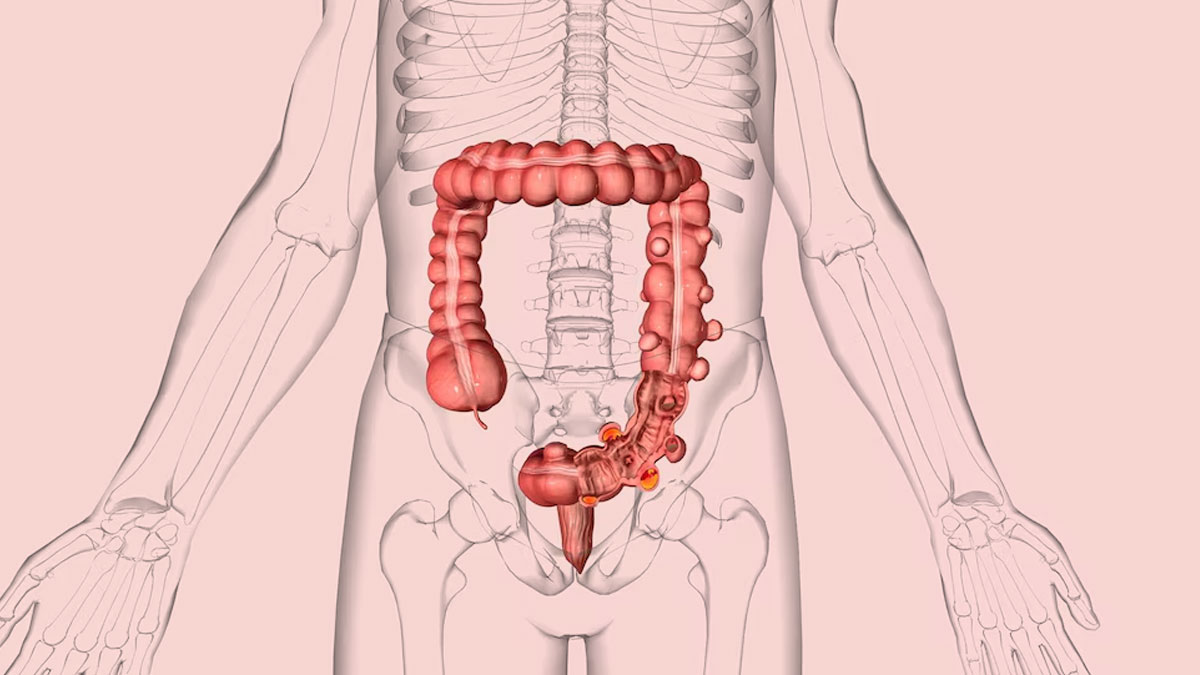
Diverticula are the most commonly found in the bottom portion of the large intestine or colon. Diverticulitis is a condition that arises when diverticula develops in the lining of your digestive system and becomes inflamed or infected. It most commonly affects the lower part of the colon or large intestine.
Table of Content:-
“This condition is caused by blockages in the diverticula opening produced by undigested food particles or faeces, which in turn infects and inflames the diverticulum. The main cause of this obstruction is thought to be a lack of dietary fibre in the body, which serves to soften the stool and make it easier to pass through. Due to a lack of fibre in the diet, the stool created is hard and difficult to pass through, causing blockages in the diverticula opening and inflammation,” said Dr Suranjit Chatterjee, Senior Consultant Internal Medicine, Indraprastha Apollo Hospitals.

Symptoms of Diverticulitis
The signs and symptoms of diverticulitis can range from mild to severe, typically presenting suddenly and worsening over a few days. The most common symptoms include:
According to MayoClinic, pain might be continuous and last for several days. The pain usually occurs on the lower left side of the abdomen. However, the right side of the abdomen can be more uncomfortable.
- Abdominal Bloating and Gas
- Fever and Chills
- Nausea and Vomiting
- Changes in Bowel Habits: Such as constipation or, less commonly, diarrhoea.
- Loss of Appetite
Also read: How To Cleanse Your Intestines And Colon Naturally?
Causes and Risk Factors
While the exact cause of diverticulitis is not fully understood, it is believed to occur when faecal matter becomes trapped in the diverticula, leading to infection or inflammation.
The main cause of this obstruction is thought to be a lack of dietary fibre in the body, which serves to soften the stool and make it easier to pass through. Due to a lack of fibre in the diet, the stool created is hard and difficult to pass through, causing blockages in the diverticula opening and inflammation.
According to the National Institute of Diabetes and Digestive and Kidney Disease, pain in case of diverticulitis is usually strong and sudden, although it can also be modest and worsen over several days. The degree of the pain may vary over time. Several factors can increase the risk of developing diverticulitis, including:
- Ageing: The incidence of diverticulitis increases with age.
- Diet: Diets low in fibre and high in refined foods may increase the risk.
- Lack of Exercise
- Obesity
- Smoking
Treatment of Diverticulitis
Treatment for diverticulitis depends on the severity of the condition. Options include:
1. Mild Diverticulitis
Antibiotics are recommended by experts to treat the infection. Temporarily, to allow the colon to heal without being stressed by the digestion of food. Avoiding the use of nonsteroidal anti-inflammatory drugs (NSAIDs) like ibuprofen, which could worsen the condition. Acetaminophen is usually recommended.

2. Severe Diverticulitis
According to Chatterjee, needle Drainage is performed which is a treatment that involves inserting a needle into the abdomen to drain pus from an abscess.. In cases of complications such as an abscess, perforation, or fistula, surgery may be required to remove the affected part of the colon.
Also read: Inflammation of Small Intestine Or Enteritis: Know About Its Symptoms, Prevention and Treatment
Prevention
Preventative measures can help manage and prevent the occurrence of diverticulitis:
- High-Fibre Diet: A diet rich in fibre can reduce the pressure inside the intestines and help prevent flare-ups.
- Hydration: Adequate fluid intake helps keep the fibre moving through your digestive system.
- Regular Exercise: Helps maintain a healthy weight and normal bowel function.
- Avoid Smoking
Monitoring and Long-Term Management
Who have experienced diverticulitis should continue to monitor their condition with their doctor, as recurrent episodes are common. Lifestyle changes, such as increased dietary fibre and regular exercise, are critical long-term strategies to prevent further episodes of diverticulitis.
The symptoms and treatment options for diverticulitis is essential for effective management and prevention of this digestive condition. Regular medical check-ups and a healthy lifestyle are important for people with a history of diverticulitis or those at risk.
Read Next
Onlymyhealth Presents #OMHHyperLocal: Scrutinising The Safety Of Vegetables Grown On Yamuna Bank
How we keep this article up to date:
We work with experts and keep a close eye on the latest in health and wellness. Whenever there is a new research or helpful information, we update our articles with accurate and useful advice.
Current Version